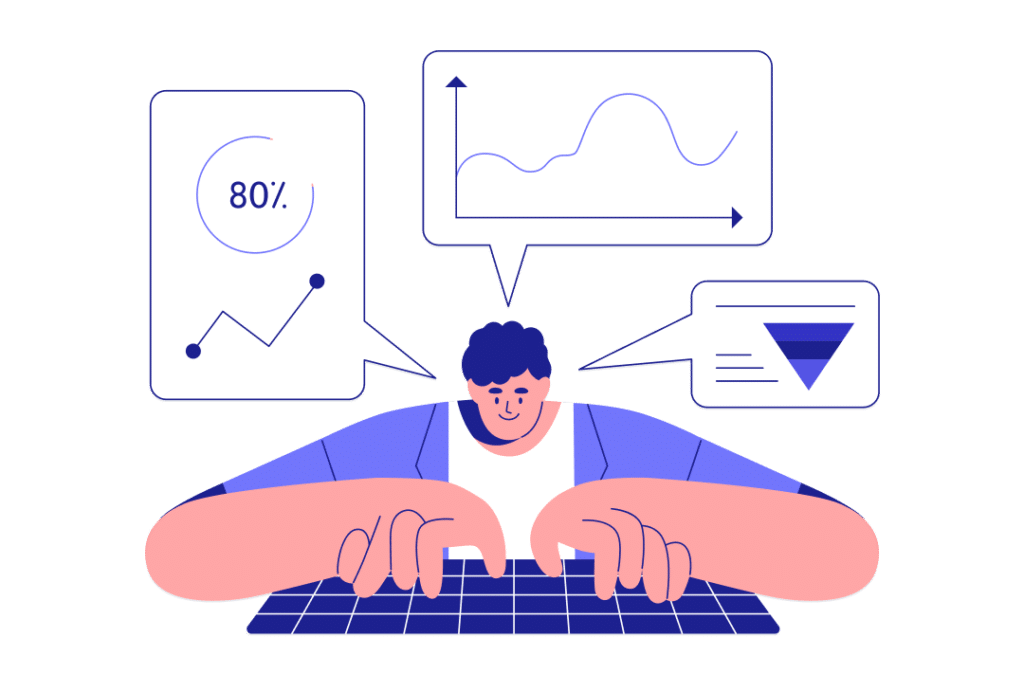- In a nutshell:AI lead scoring uses predictive algorithms to evaluate and rank potential customers based on their likelihood to convert.
- Traditional lead-scoring methods are manual, time-consuming, based on overly simplistic rules, and lack the agility to adapt to fast-changing market trends.
- Predictive lead scoring automates the process, eliminates human bias, and continuously learns and adjusts predictions over time.
- Existing tech tools like Salesforce and Hubspot have limitations in their lead-scoring capabilities and data accessibility.
- Predictive lead scoring with AI enhances the efficiency of sales and marketing teams, complements human intuition, and can be customized for different industries and businesses.
An array of hedgehogs. A thunder of hippopotamuses. A … what? … of customers? Whatever you prefer to call them, ideally, you have lots of customers checking out your business every day. And whether you’re B2B or B2C, you’ll only see some of them convert. Predictive lead scoringcan help you identify the most promising and optimize your resources to efficiently acquire a … flock of customers? Swarm? Herd? Let’s find out howpredictive lead scoringeffectively accomplishes that task and how it’s different from traditional approaches. We’ll also examine why those lead-scoring capabilities built into your existing tech stack might not deliver optimal results for your business.
Traditional Lead Scoring Uses Manual Methods to Prioritize Leads
Traditional lead scoringis used by sales and marketing teams to evaluate and rank potential customers or leads based on predetermined criteria and an ideal customer profile. This approach aims to identify which leads are more likely to become paying customers. Then, sales teams can prioritize their efforts and focus on leads more likely to convert. With thismanualapproach, each lead gets a score based on a set of attributes. Those might include demographic information, firmographic details, their history of engagement with the brand, and data on their behavior related to the brand. Those last two could include email opens, website visits, and interactions with marketing collateral. Each attribute is typically assigned a specific weight or value based on the scorer’s subjective judgment of which data points reflect promising behavior. Adding up all of these values creates a score for that lead. High-scoring leads are considered more promising, and the sales staff andmarketing teamwill prioritize them — for example, with personal outreach or retargeting to nurture and convert.
Traditional Lead Scoring is Inefficient, Biased, and Rigid
If you’re a data-driven decision-maker, you’re likely seeing some issues here already. This method can betedious and time-consumingif carried out manually. It relies on assumptions and predefined criteria — but if you know anything about humans, it’s that they often defy our assumptions and display complex new behaviors. Let's not even mention human error. Additionally, in a fast-changing world where market trends and consumer activities shift quickly, this traditional lead-scoring approach can be too rigid,lacking the agilityto respond and adapt. That agility is critical for successful revenue generation today. As Victor Antonio writesin theHarvard Business Review, “A salesperson with a rich pipeline of qualified potential clients has to make decisions on a daily, or even hourly, basis as to where to focus their time when it comes to closing deals to hit their monthly or quarterly quota. Often, this decision-making process is based on gut instinct and incomplete information.”
AI Improves Lead Scoring With Predictive Power and Automation
AI powers up traditional lead-scoring methods by usingmachine learning algorithmsto analyze and evaluate leads based on various criteria, as well as the relationships among those criteria. These tools canautomaticallyassign a score to each lead, indicating the likelihood of conversion. Instead of manually selecting important attributes and weighting them based on subjective judgment, machine learning (ML) algorithmsremove human bias. These predictive models look for patterns in the data from successful conversions of existing or past customers. Then, they look for similar patterns in the data from new leads and predict the likelihood (an AI lead score) that each lead will convert into a sale. Additionally,explainableAI lead scoring models (like Pecan’s) can tell you which attributes of each customer most affected the prediction. That information can be helpful on the individual level for each lead (maybe interacting with a specific piece of marketing collateral was especially influential). It’s also beneficial to examine that information on a broader level across all leads (perhaps visiting your website positively influences leads’ likelihood to convert). Finally, predictive lead scoring with AI isdynamic and adaptable. The model can learn from new data and adjust its predictions as conditions change and new customers are successfully acquired. This continuous learning and adjustment for your evolving, entire customer journey ensures more accurate and informed lead prioritization over time.
AI Automates Predictive Lead Scoring for Agility and Continuous Improvement
In case it wasn’t clear already, the ideal, AI-driven predictive lead scoring process is automated. Automating with AIlead scoring is a crucial step in optimizing marketing and sales efforts. Using AutoML —automated machine learning, which selects and refines models automatically to optimize performance — it’s possible to crunch vast amounts of data to identify the most promising leads. This automation eliminates the need for manual scoring, saving time and resources, and — as mentioned above — includes ongoing improvement of the scoring model. By using all their data with artificial intelligence lead scoring, marketers and the sales team can prioritize and focus their efforts on the leads most likely to result in sales. This approach can lead to more efficient and effective lead management. Ultimately, this means your herd (or flock or swarm, if you prefer) of customers becomes ever larger, thanks to improved conversion rates — and your revenue grows.
Get tips from our CEO and co-founder, Zohar Bronfman, on how to effectively communicate about AI with stakeholders.How B2B and B2C Businesses Use Predictive Lead Scoring With AI
It’s important to note that lead scoring can be relevant for both B2B and B2C companies, though it can look slightly different. B2B lead scoringdraws from diverse lead attributes. These might include company size, industry, and interactions with sales. This information is gathered over a longer, more complex sales cycle characterized by research, webinars, and email exchanges. Multiple decision-makers and negotiations may be involved. Finally, while B2B businesses may have less data overall, they can often benefit from predictive lead-scoring models. After implementing predictive lead scoring software,B2B companies have seentheir SDR lead-to-appointment conversion rate double and a 5x increase in the appointment-to-opportunity conversion rate — undoubtedly supporting revenue growth. Meanwhile,B2C lead scoringrelies on consumer interactions, like purchase history, website behavior, and social engagement. This array of interactions reflects today’s complex customer journeys and varied buying patterns. Additionally, B2C conversions result from a mix of individual preferences and impulse triggers. That means AI models need to anticipate personal purchasing moments. Even though that sounds incredibly specific to individuals, recurring patterns in consumer behavior make it possible to detect patterns and predict conversions, especially in the larger quantities of data that B2C businesses typically have.
Your Existing Tech's Lead Scoring Add-ons Aren't Enough
Some common sales and marketing platforms — such as Salesforce and Hubspot — already include built-in lead scoring solutions. Unfortunately, because lead scoring isn’t the main focus of these tools, it isn’t always a fully developed, versatile capability. After all, it’s usually justan add-on, not their primary technology where they will invest in innovation and usability. It may also require paying additional charges. Additionally, you won’t necessarily have the ability to useall your relevant datafrom across the entire customer journey — whatever the data source — in your model. There will also likely be limitations on the accessibility and completeness of the information provided. For example, Salesforce’sEinstein Lead Scoring and Opportunity Scoringoptions can’t pull in data beyond what is stored in Salesforce. And, if your data doesn’t meet the quantity requirements for Einstein, Salesforce will use a“global model”with anonymized data across all their customers. However, many businesses using lead scoring find that they benefit from using external data from outside Salesforce to enrich their training data (vs. nonspecific, “global” data from Salesforce itself). A further limitation is that youcan’t exportlead scores from Salesforce. Want to use the lead scores elsewhere? Not an option. Hubspotoffers both manual and predictive lead scoring. However, Hubspot’s predictive lead scoring model is a “black box,” as they sayon their website:
HubSpot uses black box machine learning to provide predictions. With black box machine learning, the input and outputs of the model are known, but it is unknown how the input is transformed into the output. For lead scoring, this means it’s not possible to know exactly how each input contributes to a contact’s score.
Users of Hubspot’s predictive lead scoring miss the opportunity to obtain far more insight into their customers. As mentioned above, an explainable approach to predictive lead scoring offers far more insight into what has affected predictions of a lead’s likelihood to convert. That additional information lets you customize outreach to make it more personalized and efficient. When exploring your AI lead scoring options, look for afully developed, transparent systemfor predictive lead scoring that can build accurate predictions with all of your rich, valuable data.
Some Potential Concerns about Predictive Lead Scoring
Will predictive lead scoring with AI lead to job losses for sales and marketing professionals?
Lots of people are concerned that artificial intelligence may affect the job market for various professional skills. However, predictive lead scoring enhances theefficiency and effectivenessof sales and marketing teams by automating repetitive tasks, allowing them to focus on more strategic and creative aspects of their roles. Instead of carrying out manual lead scoring and tediously constructing scoring systems, AI can handle this task quickly and well. Additionally, with the predictions, marketing and sales teams can improve their overall performance. When you know which leads are most likely to convert and can better judge lead quality, you have anadvantagethat other sellers will lack. Overall, AI implementation in lead scoring should be seen as a tool that empowers sales and marketing professionals, rather than a threat to their jobs.
Does using AI for lead scoring mean we're not valuing human intuition?
Humans, you still have a role to play! Artificial intelligence can efficiently analyze tons of data but doesn’t replace human decision-making. Instead, it complements human intuition with recommendations and insights. Humans can still take action on scored leads using a variety of information available to them, including their unique subject matter knowledge and wisdom gained from experience. After all, as rich and informative as data can be, there are still some things that it just can’t capture — and that’s where having a “human in the loop” is vital. Ultimately, artificial intelligence enhances and supports humans. It's not an authority that must be obeyed no matter what.
Can AI lead scoring work in all industries?
You might be concerned that your industry or specific business isn’t a good fit for an AI lead-scoring solution. However, predictive lead-scoring models are highly adaptable and can be tailored to meet the needs of different industries and businesses. Thatcustomizationis vital and may not be offered by all lead-scoring tools. You want to ensure the model effectively captures your target audience’s unique characteristics and behaviors. Customization will maximize the accuracy and effectiveness of your lead-scoring efforts, ultimately driving better sales and marketing outcomes.
How to Choose an AI Predictive Lead-Scoring Solution
We’ve already touched on some essential criteria for selecting an AI predictive lead scoring tool: customization, automation, and explainability of scores. Here are a few more considerations to keep in mind:
- Accuracy:Look for a tool with a proven track record of accurate predictions based on historical data, as shown by other customers’ experiences and results.
- Ease of use:Ensure the tool can easily integrate with your existing customer relationship management (CRM) platform, marketing automation tools, and any other data sources you use. The tool must also align with your overall marketing and sales workflows so teams can use the scores daily to improve results.
- Data preparation:No one’s data is perfect, but some lead scoring tools will expect it to be. A lead scoring system that provides automated data cleaning and preparation will save you days of tedious data tidying and ensure better-quality predictions.
- Privacy and security:Make surethe tool complieswith data privacy regulations and best practices for security.
Taking the Next Steps With Predictive Lead Scoring
Ready to expand your customer base with AI? Predictive lead scoring is invaluable for seeing your leads’ future and knowing which ones you can bring on board most efficiently. You can do more with less by targeting your growth efforts more precisely, generating efficiencies immediately. Want to take a closer look?Get in touchwith us to chat about how predictive AI lead scoring can fit your team’s goals.







